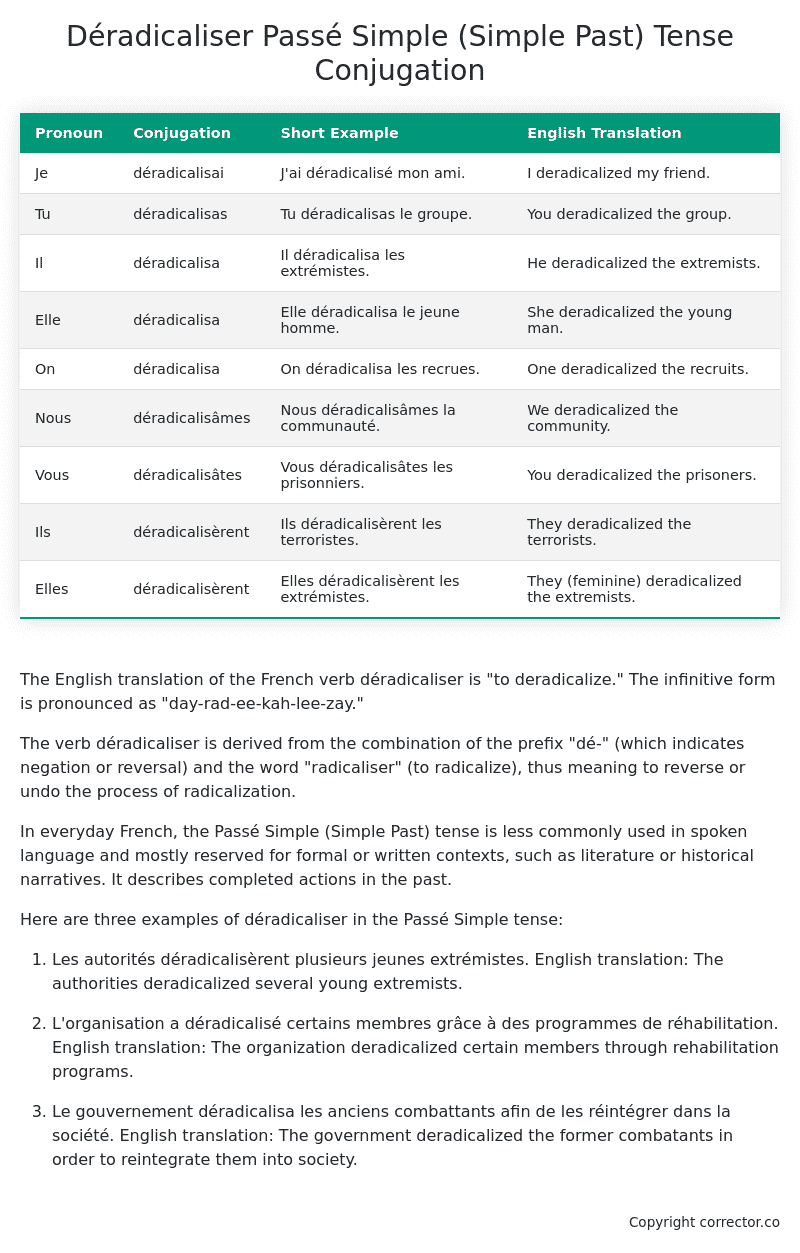Passé Simple (Simple Past) Tense Conjugation of the French Verb déradicaliser
Introduction to the verb déradicaliser
The English translation of the French verb déradicaliser is “to deradicalize.” The infinitive form is pronounced as “day-rad-ee-kah-lee-zay.”
The verb déradicaliser is derived from the combination of the prefix “dé-” (which indicates negation or reversal) and the word “radicaliser” (to radicalize), thus meaning to reverse or undo the process of radicalization.
In everyday French, the Passé Simple (Simple Past) tense is less commonly used in spoken language and mostly reserved for formal or written contexts, such as literature or historical narratives. It describes completed actions in the past.
Here are three examples of déradicaliser in the Passé Simple tense:
-
Les autorités déradicalisèrent plusieurs jeunes extrémistes.
English translation: The authorities deradicalized several young extremists. -
L’organisation a déradicalisé certains membres grâce à des programmes de réhabilitation.
English translation: The organization deradicalized certain members through rehabilitation programs. -
Le gouvernement déradicalisa les anciens combattants afin de les réintégrer dans la société.
English translation: The government deradicalized the former combatants in order to reintegrate them into society.
Table of the Passé Simple (Simple Past) Tense Conjugation of déradicaliser
| Pronoun | Conjugation | Short Example | English Translation |
|---|---|---|---|
| Je | déradicalisai | J’ai déradicalisé mon ami. | I deradicalized my friend. |
| Tu | déradicalisas | Tu déradicalisas le groupe. | You deradicalized the group. |
| Il | déradicalisa | Il déradicalisa les extrémistes. | He deradicalized the extremists. |
| Elle | déradicalisa | Elle déradicalisa le jeune homme. | She deradicalized the young man. |
| On | déradicalisa | On déradicalisa les recrues. | One deradicalized the recruits. |
| Nous | déradicalisâmes | Nous déradicalisâmes la communauté. | We deradicalized the community. |
| Vous | déradicalisâtes | Vous déradicalisâtes les prisonniers. | You deradicalized the prisoners. |
| Ils | déradicalisèrent | Ils déradicalisèrent les terroristes. | They deradicalized the terrorists. |
| Elles | déradicalisèrent | Elles déradicalisèrent les extrémistes. | They (feminine) deradicalized the extremists. |
Other Conjugations for Déradicaliser.
Le Present (Present Tense) Conjugation of the French Verb déradicaliser
Imparfait (Imperfect) Tense Conjugation of the French Verb déradicaliser
Passé Simple (Simple Past) Tense Conjugation of the French Verb déradicaliser (You’re reading it right now!)
Passé Composé (Present Perfect) Tense Conjugation of the French Verb déradicaliser
Futur Simple (Simple Future) Tense Conjugation of the French Verb déradicaliser
Futur Proche (Near Future) Tense Conjugation of the French Verb déradicaliser
Plus-que-parfait (Pluperfect) Tense Conjugation of the French Verb déradicaliser
Passé Antérieur (Past Anterior) Tense Conjugation of the French Verb déradicaliser
Futur Antérieur (Future Anterior) Tense Conjugation of the French Verb déradicaliser
Subjonctif Présent (Subjunctive Present) Tense Conjugation of the French Verb déradicaliser
Subjonctif Passé (Subjunctive Past) Tense Conjugation of the French Verb déradicaliser
Subjonctif Imparfait (Subjunctive Imperfect) Tense Conjugation of the French Verb déradicaliser
Conditionnel Présent (Conditional Present) Tense Conjugation of the French Verb déradicaliser
Conditionnel Passé (Conditional Past) Tense Conjugation of the French Verb déradicaliser
Conditionnel Passé II (Conditional Past II) Tense Conjugation of the French Verb déradicaliser
L’impératif Présent (Imperative Present) Tense Conjugation of the French Verb déradicaliser
L’impératif Passé (Imperative Past) Tense Conjugation of the French Verb déradicaliser
L’infinitif Présent (Infinitive Present) Tense Conjugation of the French Verb déradicaliser
L’infinitif Passé (Infinitive Past) Tense Conjugation of the French Verb déradicaliser
Le Participe Présent (Present Participle) Tense Conjugation of the French Verb déradicaliser
Le Participe Passé (Past Participle) Tense Conjugation of the French Verb déradicaliser
Struggling with French verbs or the language in general? Why not use our free French Grammar Checker – no registration required!
Get a FREE Download Study Sheet of this Conjugation 🔥
Simply right click the image below, click “save image” and get your free reference for the déradicaliser Passé Simple tense conjugation!

Déradicaliser – About the French Passé Simple (Simple Past) Tense
Formation
Usage
Narration
Historical Context
Interactions with other tenses
Passé Composé
Imparfait
Conditional and Subjunctive
Summary
I hope you enjoyed this article on the verb déradicaliser. Still in a learning mood? Check out another TOTALLY random French verb conjugation!


